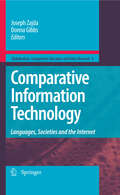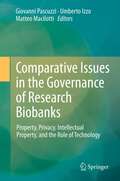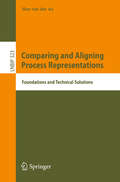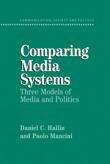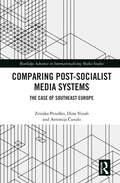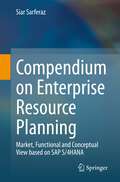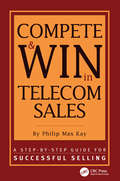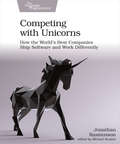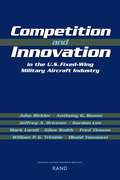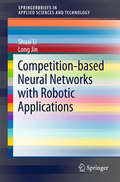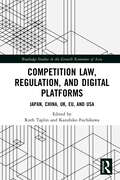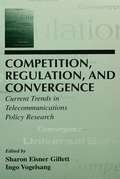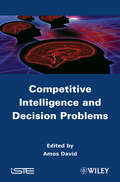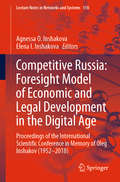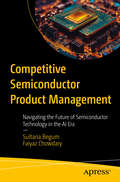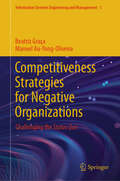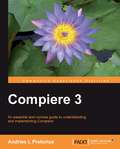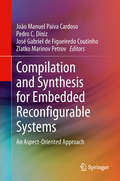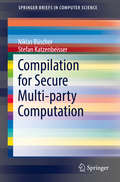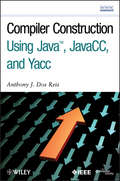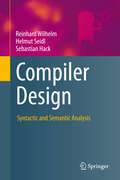- Table View
- List View
Comparative Information Technology: Languages, Societies and the Internet (Globalisation, Comparative Education and Policy Research #4)
by Joseph Zajda Donna GibbsThis volume offers a critique of the nexus between ICT and its impact on society, individuals and educational institutions. One of the most significant dimensions of globalisation has been the rapid development of information and communications technologies (ICTs). Our lives have been changed by ICTs in numerous ways and the implications for education are enormous. The ICTs have transformed the linguistic, cognitive and visual dimensions of human communication, as well as our perceptions of the self, and social identity in the global culture. They have facilitated the development of new dimensions of digital literacy, such as blogging and sms messaging. In this sense, cyberlanguage continues to evolve by borrowing and adapting familiar words, coining new expressions, and embracing particular styles. The book provides directions in education and policy research, relevant to transformational educational reforms in the 21st century.
Comparative Issues in the Governance of Research Biobanks: Property, Privacy, Intellectual Property, and the Role of Technology
by Umberto Izzo Matteo Macilotti Giovanni PascuzziIn the last few years, the boom in biobanking has prompted a lively debate on a host of interrelated legal issues, such as the Gordian knot of the ownership of biological materials, as well as privacy concerns. The latter are due to the difficulty of accepting that biological samples must be completely anonymous without making it practically impossible to exploit their information potential. The issues also include the delicate role and the changing content of the donor's "informed consent" as the main legal tool that may serve to link the privacy and property interests of donors with the research interests and the set of principles that should be at the core of the biobanking practice. Lastly, the IP issues and the patentability of biological samples as well as the protection of databases storing genetic information obtained from the samples are covered. Collecting eighteen essays written by eminent scholars from Italy, the US, the UK and Canada, this book provides new solutions to these problems. From a comparative viewpoint, it explores the extent to which digital technology may assist in tackling the numerous regulatory issues raised by the practice of biobanking for research purposes. These issues may be considered and analyzed under the traditional paradigms of Property, Privacy, Informed Consent and Intellectual Property.
Comparative Public Opinion
by Cameron D. Anderson and Mathieu TurgeonThis book presents a comprehensive examination of public opinion in the democratic world. Built around chapters that highlight key explanatory frameworks used in understanding public opinion, the book presents a coherent study of the subject in a comparative perspective, emphasizing and interrogating immigration as a key issue of high concern to most mass publics in the democratic world. Key features of the book include: Covers several theoretical issues and determinants of opinion such as the effects of personality, age and life cycle, ideology, social class, partisanship, gender, religion, ethnicity, language, and media, highlighting over time the effects of political, social, and economic contexts. Each chapter explores the theoretical rationale, mechanisms of effect, and use in the scholarly literature on public opinion before applying these to the issue of immigration comparatively and in specific places or regions. Widely comparative using a nine-country sample (Australia, Canada, France, Germany, Italy, Portugal, Switzerland, the United Kingdom, and the United States of America) in the analysis of individual-level determinants of public opinion about immigration and extending to other countries like Belgium, Brazil, and Japan when evaluating contextual factors. This edited volume will be essential reading for students, scholars, and practitioners interested in public opinion, political behaviour, voting behaviour, politics of the media, immigration, political communication, and, more generally, democracy and comparative politics.
Comparative Textual Media: Transforming The Humanities In The Postprint Era
by N. Katherine Hayles Jessica PressmanFor the past few hundred years, Western cultures have relied on print. When writing was accomplished by a quill pen, inkpot, and paper, it was easy to imagine that writing was nothing more than a means by which writers could transfer their thoughts to readers. The proliferation of technical media in the latter half of the twentieth century has revealed that the relationship between writer and reader is not so simple. From telegraphs and typewriters to wire recorders and a sweeping array of digital computing devices, the complexities of communications technology have made mediality a central concern of the twenty-first century. Despite the attention given to the development of the media landscape, relatively little is being done in our academic institutions to adjust. <p><p> In Comparative Textual Media, editors N. Katherine Hayles and Jessica Pressman bring together an impressive range of essays from leading scholars to address the issue, among them Matthew Kirschenbaum on archiving in the digital era, Patricia Crain on the connection between a child's formation of self and the possession of a book, and Mark Marino exploring how to read a digital text not for content but for traces of its underlying code. Primarily arguing for seeing print as a medium along with the scroll, electronic literature, and computer games, this volume examines the potential transformations if academic departments embraced a media framework. Ultimately, Comparative Textual Media offers new insights that allow us to understand more deeply the implications of the choices we, and our institutions, are making.
Comparing and Aligning Process Representations: Foundations and Technical Solutions (Lecture Notes in Business Information Processing #323)
by Han van der AaThis doctoral thesis focuses on the spread of process information in organizations and, in particular, on the mitigation of the problems caused by the spread of information on a single process over numerous models, documents, and systems.Processes within organizations can be highly complex chains of inter-related steps, involving numerous stakeholders and information systems. Due to this complexity, having access to the right information is vital to the proper execution and effective management of an organization’s business processes. The main contributions of this thesis are five techniques that focus on the alignment and comparison of process information from different informational artifacts. Each of these techniques tackles a specific scenario involving multiple informational artifacts that contain process information in different representation formats.
Comparing Media Systems
by Daniel C. Hallin Paolo ManciniComparing Media Systems Beyond the Western World offers a broad exploration of the conceptual foundations for comparative analysis of media and politics globally. It takes as its point of departure the widely used framework of Daniel C. Hallin and Paolo Mancini's Comparing Media Systems, exploring how the concepts and methods of their analysis do and do not prove useful when applied beyond the original focus of their "most similar systems" design and the West European and North American cases it encompassed. It is intended both to use a wider range of cases to interrogate and clarify the conceptual framework of Comparing Media Systems and to propose new models, concepts, and approaches that will be useful for dealing with non-Western media systems and with processes of political transition. Comparing Media Systems Beyond the Western World covers, among other cases, Brazil, China, Israel, Lebanon, Lithuania, Poland, Russia, Saudi Arabia, South Africa, and Thailand.
Comparing Post-Socialist Media Systems: The Case of Southeast Europe (Routledge Advances in Internationalizing Media Studies)
by Zrinjka Peruško Dina Vozab Antonija ČuvaloThis book explains divergent media system trajectories in the countries in southeast Europe, and challenges the presumption that the common socialist experience critically influences a common outcome in media development after democratic transformations, by showing different remote and proximate configuration of conditions that influence their contemporary shape. Applying an innovative longitudinal set-theoretical methodological approach, the book contributes to the theory of media systems with a novel theoretical framework for the comparative analysis of post-socialist media systems. This theory builds on the theory of historical institutionalism and the notion of critical junctures and path dependency in searching for an explanation for similarities or differences among media systems in the Eastern European region. Extending the understanding of media systems beyond a political journalism focus, this book is a valuable contribution to the literature on comparative media systems in the areas of media systems studies, political science, Southeast and Central European studies, post-socialist studies and communication studies.
Compendium on Enterprise Resource Planning: Market, Functional and Conceptual View based on SAP S/4HANA
by Siar SarferazThis book explains the functional scope, the data model, the solution architecture, the underlying engineering concepts, and the programming model of SAP S/4HANA as the most well-known enterprise resource planning (ERP) system. The approach is to start with general concepts and then to proceed step-by-step to concrete implementations in SAP S/4HANA. In the first part the reader learns about the market view of ERP solutions and vendors. The second part deals with the business processes for sales, marketing, finance, supply chain, manufacturing, services, procurement, and human resources which are covered with SAP S/4HANA. In the third part the underlying concepts of SAP S/4HANA are described, for example in-memory storage, analytics and search, artificial intelligence, process and data integration, security and compliance, lifecycle management, performance and scalability, configuration and implementation. The book is concluded with a final chapter explaining how to deploy an appliance to explore SAP S/4HANA. The target audience for the book are managers and business analysts who want to understand the market situation and future ERP trends, end users and process experts who need to comprehend the business processes and the according solution capabilities provided with SAP S/4HANA, architects and developers who have to learn the technical concepts and frameworks for enhancing SAP S/4HANA functionality, and consultants and partners who require to adopt and configure SAP S/4HANA.
Compete and Win in Telecom Sales: A Step-by -Step Guide for Successful Selling
by Philip Max KayFor anyone ready to launch a successful career in sales for telecom equipment, services and technologies, or for veterans ready to break through to a higher level, this book provides a practical eight-step program for successful selling.
Competency Web: The Corporate DNA
by N. P. RajasekharanThe Competency Web is an inevitable tool and a process in the context of transformation and change. All organisations require this web that is configured to suit each company.
Competing with Unicorns: How the World's Best Companies Ship Software and Work Differently
by Jonathan RasmussonToday's tech unicorns develop software differently. They've developed a way of working that lets them scale like an enterprise while working like a startup. These techniques can be learned. This book takes you behind the scenes and shows you how companies like Google, Facebook, and Spotify do it. Leverage their insights, so your teams can work better together, ship higher-quality product faster, innovate more quickly, and compete with the unicorns. Massively successful tech companies, or Unicorns, have discovered how to take the techniques that made them successful as a startup and scale them to the enterprise level. Amazon, Facebook, Google, and Spotify all work like startups, despite having workforces numbering in the tens of thousands. Ex-Spotify engineer and coach, Jonathan Rasmusson, takes you behind the scenes and shows you how to develop software the way the best companies do it. Learn how to give teams purpose through Missions, empower and trust with Squads, and align large scale efforts through Bets. Create the culture necessary to make it happen. If you're a tech or product lead and you want to ship product better, this is your playbook on how the world's best do it. If you're an engineer, tester, analyst, or project manager, and you suspect there are better ways you could be working, you are correct. This book will show you how. And if you're a manager, Agile coach, or someone just charged with improving how your company ships software, this book will give you the tools, techniques, and practices of the world's most innovative, delivery-focused companies. Don't just admire the top companies - learn from them.
Competition and Innovation in the U.S. Fixed-Wing Military Aircraft Industry
by Gordon T. Lee Mark A. Lorell Jeffrey A. Drezner John Birkler Anthony G. BowerAssess prospects for innovation and competition in the military combat-aircraft industry.
Competition-Based Neural Networks with Robotic Applications (SpringerBriefs in Applied Sciences and Technology)
by Shuai Li Long JinFocused on solving competition-based problems, this book designs, proposes, develops, analyzes and simulates various neural network models depicted in centralized and distributed manners. Specifically, it defines four different classes of centralized models for investigating the resultant competition in a group of multiple agents. With regard to distributed competition with limited communication among agents, the book presents the first distributed WTA (Winners Take All) protocol, which it subsequently extends to the distributed coordination control of multiple robots. Illustrations, tables, and various simulative examples, as well as a healthy mix of plain and professional language, are used to explain the concepts and complex principles involved. Thus, the book provides readers in neurocomputing and robotics with a deeper understanding of the neural network approach to competition-based problem-solving, offers them an accessible introduction to modeling technology and the distributed coordination control of redundant robots, and equips them to use these technologies and approaches to solve concrete scientific and engineering problems.
Competition Law, Regulation and Digital Platforms: Japan, China, UK, EU and USA (Routledge Studies in the Growth Economies of Asia)
by Ruth Taplin Kazuhiko FuchikawaThis book confronts and analyses how competition law in its present form is unable to deal with the new advances in digital technology that have made tech giants not subject to national jurisdictions as they straddle the world, with a particular focus on Japan, China, UK, EU and USA.Demonstrating how the gatekeeping role of digital platforms has broken through the boundaries of national regulation, this book highlights examples where companies have broken and infringed antitrust law with impunity, pursuing self-preferencing and unfair competition practices solely for their own profitability. It also identifies how tech giants can open their digital platforms for fair use by consumers, small and medium enterprises (SMEs), and creators ,while still allowing tech giants to maintain their important role as gatekeepers of digital security that protects users from cyberattacks. This is followed by an examination of the similarities between tech giants and big pharma within the competition law and intellectual property context, revealing how tech giants are beginning to target the healthcare sector.Exploring how intellectual property rights are interwoven through new modernising regulations to curtail the dominance of Big Tech on digital platforms, this book will appeal to students, scholars and practitioners of Business Ethics, Intellectual Property, Law, and Regulation.
Competition, Regulation, and Convergence: Current Trends in Telecommunications Policy Research (LEA Telecommunications Series)
by Sharon Eisner Gillett Ingo VogelsangThe telecommunications industry has experienced dynamic changes over the past several years, and those exciting events and developments are reflected in the chapters of this volume. The Telecommunications Policy Research Conference (TPRC) holds an unrivaled place at the center of national public policy discourse on issues in communications and information. TPRC is one of the few places where multidisciplinary discussions take place as the norm. The papers collected here represent the current state of research in telecommunication policy, and are organized around four topics: competition, regulation, universal service, and convergence. The contentious competition issues include bundling as a strategy in software competition, combination bidding in spectrum auctions, and anticompetitive behavior in the Internet. Regulation takes up telephone number portability, decentralized regulatory decision making versus central regulatory authority, data protection, restrictions to the flow of information over the Internet, and failed Global Information Infrastructure initiatives. Universal service addresses the persistent gap in telecommunications from a socioeconomic perspective, the availability of competitive Internet access service and cost modeling. The convergence section concentrates on the costs of Internet telephony versus circuit switched telephony, the intertwined evolution of new services, new technologies, and new consumer equipment, and the politically charged question of asymmetric regulation of Internet telephony and conventional telephone service.
Competitive Intelligence and Decision Problems
by Amos DavidThe development of a research, teaching, or application of competitive (economic) intelligence requires a strategic and transverse vision in regards to related issues. It is essential to integrate the role of culture when interpreting results, either from the training of a specialist or in respect to a country or region. The authors of this book, members of an expert group supported by the CNRS in France, bring all of their talents together to create a comprehensive book that does just this and more.
Competitive Programming in Python: 128 Algorithms to Develop your Coding Skills
by Christoph Dürr Jill-Jênn VieWant to kill it at your job interview in the tech industry? Want to win that coding competition? Learn all the algorithmic techniques and programming skills you need from two experienced coaches, problem setters, and jurors for coding competitions. The authors highlight the versatility of each algorithm by considering a variety of problems and show how to implement algorithms in simple and efficient code. Readers can expect to master 128 algorithms in Python and discover the right way to tackle a problem and quickly implement a solution of low complexity. Classic problems like Dijkstra's shortest path algorithm and Knuth-Morris-Pratt's string matching algorithm are featured alongside lesser known data structures like Fenwick trees and Knuth's dancing links. The book provides a framework to tackle algorithmic problem solving, including: Definition, Complexity, Applications, Algorithm, Key Information, Implementation, Variants, In Practice, and Problems. Python code included in the book and on the companion website.
Competitive Russia: Proceedings of the International Scientific Conference in Memory of Oleg Inshakov (1952-2018) (Lecture Notes in Networks and Systems #110)
by Agnessa O. Inshakova Elena I. InshakovaThis proceedings book presents papers from the 18th International Scientific Conference, held in September 2019 at Volgograd State University (Russia). The research findings are largely based on the theoretical assumptions of Oleg Inshakov, renowned for his pioneering work on the theory of economic genetics and the theory of “development nucleus” for economic systems.The papers focus on the impact of the 4th industrial revolution on economic growth, the concept of ecosystems corresponding to the rapid spread of digital technologies, regulatory and legal aspects of the Russian economy digitalization, the development of digital technologies in EAEU and BRICS foreign trade, and the corresponding law enforcement measures.The book is intended for academics and practitioners, as well as anyone interested in the problems of new industrialization and the digital transformation of the economy of business entities, regions, countries and integration unions, and their legal regulation to enhance competitiveness on a national and global scale
Competitive Semiconductor Product Management: Navigating the Future of Semiconductor Technology in the AI Era
by Sultana Begum Faiyaz ChowdaryThis book is your guide to navigating the complex landscape of the semiconductor product industry. With the emerging benefits of artificial intelligence (AI), the semiconductor industry is at crossroads of unprecedented demand, touching almost every product in the modern world. The book takes into consideration the business development opportunities and guides you through technical and business details to help you gain a deep understanding of the semiconductor product management lifecycle. From transistors to modern AI accelerators, semiconductor products are fundamental contributors to technology and shape our future. Continuous research and development are pushing the boundaries of technology disruption and demanding capabilities in semiconductor products in almost all technological spaces. This book is a one-stop resource for delivering customer-centric solutions and it unveils the secrets to crafting the perfect semiconductor product. The book takes you through the impact of factors such as The Chips Act 2022 to reveal opportunities and challenges across semiconductor product industries. It provides a systematic framework for product managers and technology business leaders to define and implement semiconductor products with competitive advantage, using a robust competitive product strategy. This book demystifies the complex technical concepts in semiconductor architecture, manufacturing technology, and performance management via easy-to-understand, real-world examples. What You Will Learn Develop knowledge of semiconductor hardware architecture and software organization Dig into industry eco-system challenges, factors contributing to success, and failures of semiconductor products Know the secrets to defining competitive semiconductor product strategies and roadmaps Be aware of factors impacting semiconductor product manufacturing and performance management Understand the strategies of the key semiconductor product leaders in the industry Gain a detailed understanding of the design, development, positioning, pricing, and supply of semiconductor products Who This Book Is For Product managers, program managers, directors of product management, vice presidents of technology, principal engineers, CEOs, executive leaders in the semiconductor industry, product architects, software and hardware design and verification engineers, technical leaders in semiconductor industries, as well as business leaders, students pursuing electrical, electronics, & communication engineering, sales, and marketing teams
Competitiveness Strategies for Negative Organizations: Challenging the Status Quo (Information Systems Engineering and Management #1)
by Beatriz Graça Manuel Au-Yong-OliveiraThe book aims to describe how a certain type of organisation may come into existence and may even become prevalent in society - what we call a negative organisation. This type of organization is one where the status quo prevails over what is best for the company, in strategic terms. Namely, certain employees who are actually very good may be forced to leave so as to not disturb the status quo and existing loyalties and ties which are actually prejudicial to the company, in the medium to long run. Change is very necessary and strategies need to change to accompany technological breakthroughs and other market developments. Wanting to maintain the same course so as not to “disrupt the waters” is often a bad strategy and the firm will suffer. Innovation must prevail over the maintenance of the status quo or, in other words, must prevail over the maintenance of the existing state of things and hierarchy. Our book discusses the topic as well as providing solutions for the situation of a firm becoming negative. Various levels of leadership in the organisation may contribute to a negative organisation and this too is discussed. We hope to have contributed in whatever small way to a more joyous, satisfactory and, above all, more productive and innovative workplace.
Compiere 3
by Andries L PretoriusThis book is a concise guide that focuses solely on implementing Compiere. It uses a business scenario case study throughout to illustrate the sort of decisions and considerations required at critical stages in a real-life Compiere implementation. If you are considering or want to easily implement Compiere in your organization, this book is for you. This book will also be beneficial to system users and administrators who wish to implement an ERP system. No previous knowledge of Compiere is required.
Compilation and Synthesis for Embedded Reconfigurable Systems: An Aspect-Oriented Approach
by José Gabriel de Figueiredo Coutinho Pedro C. Diniz João Manuel Cardoso Zlatko Marinov PetrovThis book provides techniques to tackle the design challenges raised by the increasing diversity and complexity of emerging, heterogeneous architectures for embedded systems. It describes an approach based on techniques from software engineering called aspect-oriented programming, which allow designers to control today's sophisticated design tool chains, while maintaining a single application source code. Readers are introduced to the basic concepts of an aspect-oriented, domain specific language that enables control of a wide range of compilation and synthesis tools in the partitioning and mapping of an application to a heterogeneous (and possibly multi-core) target architecture. Several examples are presented that illustrate the benefits of the approach developed for applications from avionics and digital signal processing. Using the aspect-oriented programming techniques presented in this book, developers can reuse extensive sections of their designs, while preserving the original application source-code, thus promoting developer productivity as well as architecture and performance portability. Describes an aspect-oriented approach for the compilation and synthesis of applications targeting heterogeneous embedded computing architectures. Includes examples using an integrated tool chain for compilation and synthesis. Provides validation and evaluation for targeted reconfigurable heterogeneous architectures. Enables design portability, given changing target devices· Allows developers to maintain a single application source code when targeting multiple architectures.
Compilation for Secure Multi-party Computation (SpringerBriefs in Computer Science)
by Stefan Katzenbeisser Niklas BüscherThis book presents a holistic view on compiler assisted practical secure multi-party computation (MPC) over Boolean circuits. It discusses that two or more parties jointly evaluate a function over their inputs in such a way that each party keeps its input unknown to the other parties in MPC. MPC provides a generic way to construct Privacy-Enhancing Technologies, which protect sensitive data during processing steps in untrusted environments. A major obstacle in the past was to generate MPC applications by hand. Recently, special compilers have been developed to build all kinds of applications. This book also explains in detail how efficient MPC applications can be created automatically from ANSI-C, thus, bridging the areas of cryptography, compilation and hardware synthesis. It also gives an insight into the requirements for creating efficient applications for MPC and is hence of interest to not only researchers in the area of MPC but also developers realizing practical applications with MPC. For a better understanding of the complete compile chain from ANSI-C to circuits, which is the 'machine code' of MPC, the authors first give the necessary background information on MPC protocols, Boolean logic, and logic synthesis. Then the authors describe the various compilation steps required to translate any code into an adequate circuit description. Afterwards, the authors introduce a variety of optimization techniques for two classes of MPC protocols, namely techniques that improve the runtime of applications in constant- and multi-round MPC protocols. The authors also illustrate how efficient parallelization of MPC protocols can be achieved using the assistance of compilers. It presents the effectiveness of the proposed techniques by giving a detailed evaluation on benchmarking applications. Most of the aforementioned techniques are implemented in our open source compiler that is accompanying this book and allows to study compilation for MPC in practice. Researchers who are interested in practical secure multi-party computation (MPC), and developers who are interested in realizing MPC applications in practice will find this book useful as a reference, as well as advanced-level students in computer science.
Compiler Construction Using Java, JavaCC, and Yacc
by Anthony J. Dos ReisBroad in scope, involving theory, the application of that theory, and programming technology, compiler construction is a moving target, with constant advances in compiler technology taking place. Today, a renewed focus on do-it-yourself programming makes a quality textbook on compilers, that both students and instructors will enjoy using, of even more vital importance. This book covers every topic essential to learning compilers from the ground up and is accompanied by a powerful and flexible software package for evaluating projects, as well as several tutorials, well-defined projects, and test cases.
Compiler Design: Syntactic and Semantic Analysis
by Sebastian Hack Helmut Seidl Reinhard WilhelmWhile compilers for high-level programming languages are large complex software systems, they have particular characteristics that differentiate them from other software systems. Their functionality is almost completely well-defined - ideally there exist complete precise descriptions of the source and target languages. Additional descriptions of the interfaces to the operating system, programming system and programming environment, and to other compilers and libraries are often available. This book deals with the analysis phase of translators for programming languages. It describes lexical, syntactic and semantic analysis, specification mechanisms for these tasks from the theory of formal languages, and methods for automatic generation based on the theory of automata. The authors present a conceptual translation structure, i.e., a division into a set of modules, which transform an input program into a sequence of steps in a machine program, and they then describe the interfaces between the modules. Finally, the structures of real translators are outlined. The book contains the necessary theory and advice for implementation. This book is intended for students of computer science. The book is supported throughout with examples, exercises and program fragments.
